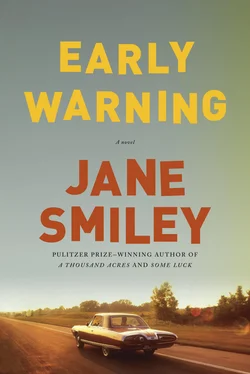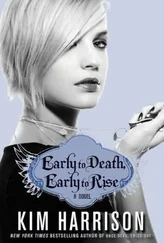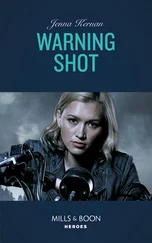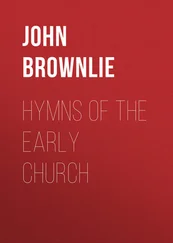Jane Smiley - Early Warning
Здесь есть возможность читать онлайн «Jane Smiley - Early Warning» весь текст электронной книги совершенно бесплатно (целиком полную версию без сокращений). В некоторых случаях можно слушать аудио, скачать через торрент в формате fb2 и присутствует краткое содержание. Год выпуска: 2015, Издательство: Knopf, Жанр: Современная проза, на английском языке. Описание произведения, (предисловие) а так же отзывы посетителей доступны на портале библиотеки ЛибКат.
- Название:Early Warning
- Автор:
- Издательство:Knopf
- Жанр:
- Год:2015
- ISBN:нет данных
- Рейтинг книги:5 / 5. Голосов: 1
-
Избранное:Добавить в избранное
- Отзывы:
-
Ваша оценка:
- 100
- 1
- 2
- 3
- 4
- 5
Early Warning: краткое содержание, описание и аннотация
Предлагаем к чтению аннотацию, описание, краткое содержание или предисловие (зависит от того, что написал сам автор книги «Early Warning»). Если вы не нашли необходимую информацию о книге — напишите в комментариях, мы постараемся отыскать её.
, a national best seller published to rave reviews from coast to coast.
Early Warning — читать онлайн бесплатно полную книгу (весь текст) целиком
Ниже представлен текст книги, разбитый по страницам. Система сохранения места последней прочитанной страницы, позволяет с удобством читать онлайн бесплатно книгу «Early Warning», без необходимости каждый раз заново искать на чём Вы остановились. Поставьте закладку, и сможете в любой момент перейти на страницу, на которой закончили чтение.
Интервал:
Закладка:
“Is there any reason that she should look like a prostitute?”
Andy crossed her ankles the other way. “This young man where he works, one of the sons, he asked me at a party last summer, when we were staying in Southampton, if I knew that Frank frequented prostitutes downtown.”
“What did you say?”
“I said yes.”
“You haven’t mentioned this to me before, Andy. Were you telling the truth?”
“I didn’t know it.”
It hadn’t been as difficult as she’d thought it would be to tell about seeing them, the couple, Frank and the woman he loved. She said, “I did go to Bonwit’s and buy a dress. Navy-blue shantung, with a matching coat. It was last season, but on sale.”
“So the sight of your husband and another woman who was rather dowdily attired motivated you in some way?”
Andy nodded.
“Let me ask you this. Which of your physical assets do you feel that this new outfit makes the most of?”
Andy lifted her chin, almost unconsciously, then put her hand on her neck. Dr. Smith said, “Your neck. Your chin.”
“My waist. My legs and ankles. I’ll put my hair up, of course.”
“So — you plan to accentuate your slenderness, your paleness in contrast to the dark color of the dress, your, let me say, androgynous qualities, as if to say to all, once again, that sexuality isn’t your business? And so your husband falling in love, if that is what it is, with a dowdy but, let’s say, womanly rival makes perfect sense.”
Andy said, “I suppose it does, from his point of view.” She said this in a reasonable tone of voice, and was just about to say something else when Dr. Smith was right there, nose to nose with her, and apparently in a rage. Andy recoiled. Dr. Smith exclaimed, “Andrea Langdon, are you so flat and small that you have no reaction to this? Is there nothing inside you, no mote of emotion or resistance? No ego? No identity? No being? You come here to me, three days a week, faithfully. As far as I can discern, you are a wraith, floating through your own life not only with no affect, but with no response. I ask you if you drink, you say yes. I ask you if you ever get drunk, you say yes. I ask you if you embarrass yourself when you get drunk, and you say no, you just doze off or go sit in a corner. Sometimes you say you laugh at nothing. That’s the extent of your transgression.”
“I thought I was supposed to behave myself if I had too much. Frank says—”
“Your husband is cheating on you! He loves another woman! He’s been to prostitutes! But your voice trembles only when you describe the murder of a stranger.”
“She was JFK’s mistress! At least that’s the rumor!” Andy coughed, thinking of how many times Dr. Grossman had explained the concept of displacement to her. She leveled her voice, then said, “I don’t think she loves him. She wasn’t leaning toward him in any way. Her body language said that she was—”
“Are you using my own terms to show me up?” Now Dr. Smith seemed really angry. Andy slid to the right, and put her left hand lightly on his arm, to prevent his moving toward her again. He said, “I am yelling at you! I am berating you! How does that make you feel?”
“I think you must be having a bad day.”
“You think this has nothing to do with you?”
Andy stared at Dr. Smith, and decided that he must have been a headstrong child, which was possibly why he had become a psychiatrist. Then she said, “Ragnarök.”
“What is that, please?” He sounded both surprised and contemptuous.
“The end of the world, in Norsk.”
“Gotterdämmerung. The Apocalypse?”
She nodded.
He said, “Please describe this to me.”
Andy closed her eyes, remembering. It was still very clear. “First, I thought, the dogs would begin to howl, and then the wolves in the forests would gather in town, Decorah, where I grew up, and join them. The howling would get so loud that you could not hear, no matter how hard you listened, that the snakes were slithering out of the river. We lived on Winneshiek, which was just south of the river. Anyway, the snakes were big as pythons, but they were cottonmouths, more poisonous than rattlesnakes, and they would slither through the front door and up the stairs, and first they would go into my parents’ room and smother them and bite them all over, but you couldn’t hear my parents’ screams because of the howling. Then the snakes would wait in the hall for me to open my door. I could stay in my room for days, but eventually they would slither around me and bite me. They would be as cold as ice. Then the house would burn down.” This was a true memory, from when she was about seven.
“What would cause the house to burn down?”
“I don’t know.” Andy shivered.
Dr. Smith stared at her, then said, “Perhaps we are getting somewhere.”
—
WHEN CLAIRE WOKE UP from what seemed to her to be a childbirth-induced state of catatonia, Gray was three months old, and it was the first of May. Forsythia was done, dogwood was done, daffodils were done, and she saw that she no longer had an excuse for not visiting Rosanna, something that ordinarily she hated to do. She woke up in a bad mood, even though the sun was shining and Paul was jolly and Gray could not have been cuter, and after she kissed Paul goodbye and he wished her a safe trip, she laid Gray carefully in his car basket, bought by Paul from someone he knew in Europe, and made sure he was properly strapped. The hour that it took them to head up the 330 was far too short, and then there was Rosanna — looking out the window, standing on the porch, her arms open wide. Claire felt her teeth grinding, but only for a moment. She held out the baby.
“Oh, what a peachy peach!” exclaimed Rosanna, but she hardly said a word to Claire. On the other hand, Claire could walk around the yard with Gray in her arms (and him only in a sweater) and smell the apple blossoms and the grass and the chamomile that she trod upon as she made her way. Yes, now Rosanna was peering at her through the kitchen window, supposedly making lunch, though really cataloguing what Claire was doing wrong, but Claire didn’t care. It was so evident, looking at Gray, that she was doing everything right. She pulled down an apple branch and inhaled the fragrance of the blossoms. Gray’s smile was the thing about him that was not like Paul — it was big and so merry that sometimes Claire wondered what Paul might have been like if he’d had a father who let him get dirty once in a while.
Rosanna had heated up frozen chicken potpies, and Claire did not say a thing about it as she stuck her fork into the crust with her left hand — Gray was cradled in her right arm, staring and making little noises.
Rosanna held out a spoon. Gray waved his hand. Rosanna said, “The only toy Frank ever had was a spoon.”
“Oh, Mama! And the only toy you ever had was a mud pie.”
“No, I had lots of toys, because your granny Mary loved to crochet puppets and tie rags into dolls. Both your grandmothers were much more fun than I was. But I was too busy looking for black widows in the dresser drawers and starvation in the cupboard.”
“Lillian is like Granny Mary.”
“She certainly is,” said Rosanna. “I spoiled her rotten, and learned a lesson.”
“What?” said Claire.
Rosanna patted Gray on the head. She said, “You can’t spoil a good one.”
“Are there any bad ones?”
“You don’t find that out until later,” Rosanna said.
Claire knew she was talking about Frank.
Once she had broken through the crust and eaten most of that, the potpie was pretty bad, Claire thought. The pieces of chicken and carrot were tiny and flavorless, and the peas were strange, too. Suddenly, almost surprising herself, Claire said, “Lillian told me that Elizabeth—”
Читать дальшеИнтервал:
Закладка:
Похожие книги на «Early Warning»
Представляем Вашему вниманию похожие книги на «Early Warning» списком для выбора. Мы отобрали схожую по названию и смыслу литературу в надежде предоставить читателям больше вариантов отыскать новые, интересные, ещё непрочитанные произведения.
Обсуждение, отзывы о книге «Early Warning» и просто собственные мнения читателей. Оставьте ваши комментарии, напишите, что Вы думаете о произведении, его смысле или главных героях. Укажите что конкретно понравилось, а что нет, и почему Вы так считаете.











